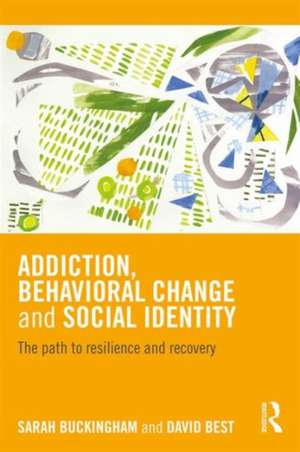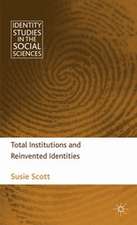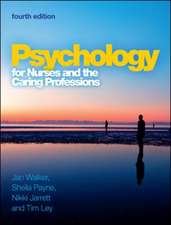Addiction, Behavioral Change and Social Identity: The path to resilience and recovery
Editat de Sarah Buckingham, David Besten Limba Engleză Paperback – 17 noi 2016
This important collection explores the social and cognitive processes that enable people who join recovery groups to address their addictive issues. In an era of increasing concern at the long-term costs of chronic ill-health, the potential to leverage group identity to inspire resilience and recovery offers a timely and practical response.
The book examines the theoretical foundations to a social identity approach in addressing behavior change across a range of contexts, including alcohol addiction, obesity and crime, while also examining topics such as the use of online forums to foster recovery. It will be essential reading for students, researchers and policy makers across health psychology and social care, as well as anyone interested in behavioral change and addiction recovery.
| Toate formatele și edițiile | Preț | Express |
|---|---|---|
| Paperback (1) | 444.62 lei 6-8 săpt. | |
| Taylor & Francis – 17 noi 2016 | 444.62 lei 6-8 săpt. | |
| Hardback (1) | 764.20 lei 6-8 săpt. | |
| Taylor & Francis – 16 noi 2016 | 764.20 lei 6-8 săpt. |
Preț: 444.62 lei
Nou
Puncte Express: 667
Preț estimativ în valută:
85.09€ • 88.51$ • 70.25£
85.09€ • 88.51$ • 70.25£
Carte tipărită la comandă
Livrare economică 14-28 aprilie
Preluare comenzi: 021 569.72.76
Specificații
ISBN-13: 9781138934085
ISBN-10: 1138934089
Pagini: 224
Ilustrații: 12 Line drawings, black and white; 2 Tables, black and white
Dimensiuni: 156 x 234 x 13 mm
Greutate: 0.34 kg
Ediția:1
Editura: Taylor & Francis
Colecția Routledge
Locul publicării:Oxford, United Kingdom
ISBN-10: 1138934089
Pagini: 224
Ilustrații: 12 Line drawings, black and white; 2 Tables, black and white
Dimensiuni: 156 x 234 x 13 mm
Greutate: 0.34 kg
Ediția:1
Editura: Taylor & Francis
Colecția Routledge
Locul publicării:Oxford, United Kingdom
Public țintă
Postgraduate, Professional, and UndergraduateCuprins
1. Introducing addiction, behavioural change and social identity 2. Applying the Social Identity Approach in Clinical and Health Domains: Key Principles and Insights 3. Addiction recovery, mutual-help organizations and social identity 4. Using social identity to promote health: The impact of group memberships on health in the context of obesity 5. Group identification and addictive health behaviours in adolescents 6. Addiction to crime and a social identity of recovery 7. The associative model of social identification (ARMS): With a particular emphasis upon addiction, behavioral change and social identity 8. Developing the Social Identity Model of Cessation Maintenance: Theory, Evidence and Implications 9. Online support communities in addiction recovery: capturing social interaction and identity change through analyses of online communication 10. Social Identity Mapping: Measuring social identity change in recovery from addiction 11. Building Bridges to Positive Social Identities: The Social Network Diagram and Opiate Substitution Treatment 12. Addiction, Behavioural Change and Social Identity-Overview and concluding comments
Notă biografică
Sarah A. Buckingham is a Freelance Researcher. Previously Sarah has worked as an integrative psychotherapist in the NHS and as a Froebel trained primary school teacher. She is also a practising artist.
David Best is Professor of Criminology and Head of Research in the Department of Law and Criminology at Sheffield Hallam University, UK and is Associate Professor at Monash University in Melbourne, Australia.
David Best is Professor of Criminology and Head of Research in the Department of Law and Criminology at Sheffield Hallam University, UK and is Associate Professor at Monash University in Melbourne, Australia.
Descriere
This important collection explores the social and cognitive processes that enable people who become part of recovery groups to address their addictive issues. It will be essential reading for students, researchers and policy makers across health psychology, social care, as well as anyone interested in behavioural change and addiction recovery.












![Promoting Psychological Well-Being in Children with Acute and Chronic Illness: A Step-By-Step Resource [With CD (Audio)]](https://i2.books-express.ro/bt/9781843109679/promoting-psychological-well-being-in-children-with-acute-and-chronic-illness.jpg)